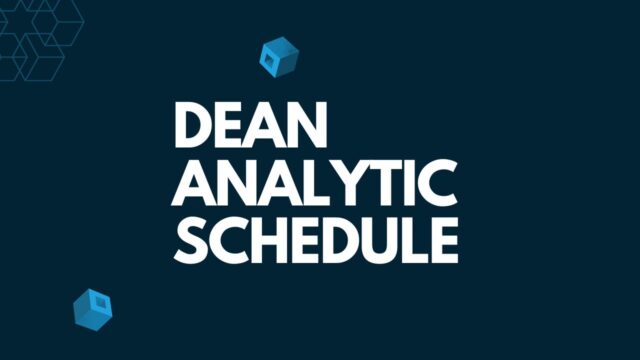
What is the Dean Analytic Schedule
The Dean Analytic Schedule is a tool that insurance companies use to rate fire insurance policies. The schedule assigns a numeric value to each risk factor, which is then used to calculate the premium. Some of the factors that are considered include the type of building, its age, the occupancy rate, and the location. The schedule is designed to give insurance companies an objective way to assess risk and set premiums. While it is not perfect, it does provide a reasonably accurate picture of the fire risk for a given property. As such, it is an important tool for both insurers and policyholders.
How was the Dean Analytic Schedule developed
The Dean Analytic Schedule was developed by Dr. Elizur Dean in the late 1800s as a way to rate fire insurance policies. Dr. Dean was working as an actuary for an insurance company at the time, and he noticed that there was no standardized way to calculate premiums. This meant that some policyholders were paying too much, while others were not paying enough. To solve this problem, Dr. Dean developed a mathematical formula that could be used to accurately calculate premiums. The formula took into account a number of factors, including the type of building being insured, its location, and the amount of coverage. The Dean Analytic Schedule quickly became the industry standard, and it is still in use today. Thanks to Dr. Dean, fire insurance policies are now much more fair and accurate.
What are some of the benefits of using the Dean Analytic Schedule
There are many benefits to using the Dean Analytic Schedule when rating fire insurance policies. The Schedule is designed to provide a comprehensive and objective assessment of a policyholder’s fire risk. It takes into account a wide range of factors, including the type of property, the age and condition of the building, the occupancy type, and the fire protection measures in place. This information is then used to generate ascore that reflects the relative risk of a fire occurring. The Schedule is an important tool for insurers, as it helps to ensure that policyholders are charged premiums that accurately reflect their risk. It also provides a valuable source of data for Underwriters, who can use it to identify trends and make informed decisions about coverage levels and pricing.
How can the Dean Analytic Schedule help businesses save money on their fire insurance premiums
Businesses often face high costs for fire insurance premiums, which can be a burden on the company budget. The Dean Analytic Schedule is a method of rating fire insurance policy that can help businesses save money. This schedule uses a variety of factors to assess the risk of a fire occurring, and this information is used to determine the premium rates. Some of the factors that are considered include the type of business, the age of the building, and the location of the business.
By taking these factors into account, businesses can be sure that they are paying the right amount for their fire insurance coverage. In addition, the Dean Analytic Schedule can help businesses negotiate lower rates with their insurance companies. By using this schedule, businesses can reduce their costs and ensure that they have the coverage they need in case of a fire.
How accurate is the Dean Analytic Schedule in predicting fire risks?
The schedule assigns a numerical value to each of a number of factors, including the type of construction, the age of the building, the occupancy type, and the fire protection system. These values are then used to calculate an Overall Fire Hazard Rating, which provides a relative measure of the fire risk posed by the property. While the Dean Analytic Schedule is generally considered to be a reliable predictor of fire risks, there is some debate as to how accurate it actually is.
Critics point to the fact that the schedule does not take into account all potential sources of ignition, such as electrical faults or careless smoking. Furthermore, it is possible for two properties with identical ratings to have very different levels of risk, due to factors such as the number of occupants or the amount of flammable materials on site. However, despite these limitations, the Dean Analytic Schedule remains one of the most commonly used methods for rating fire insurance policy.
Are there any drawbacks to using the Dean Analytic Schedule?
There are some potential drawbacks to using the Dean analytic schedule. One drawback is that it does not account for changes in risk over time. For example, if a particular type of property becomes more vulnerable to fire due to changes in construction methods, the Dean analytic schedule would not reflect this change. As a result, the policy rate could be inaccurate. Another potential drawback to using the Dean analytic schedule is that it does not account for differences in loss potential between different types of property. For example, a manufacturing facility is likely to have a higher loss potential than a residential property. However, the Dean analytic schedule treats all types of property equally. This could lead to an inaccurate policy rate.
How can businesses find out more about the Dean Analytic Schedule and how it can help them save money on their fire insurance premiums?
The Dean Analytic Schedule is a method of rating fire insurance policy that takes into account the unique characteristics of each business. The Schedule considers factors such as the type of business, the occupancy rate, the age of the building, and the fire protection measures in place. By taking these factors into account, businesses can get a more accurate picture of their fire risks and how much coverage they need. As a result, businesses can save money on their premiums by only paying for the coverage they need. To find out more about the Dean Analytic Schedule and how it can help your business, contact your insurance agent or broker.


































